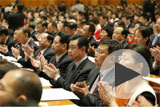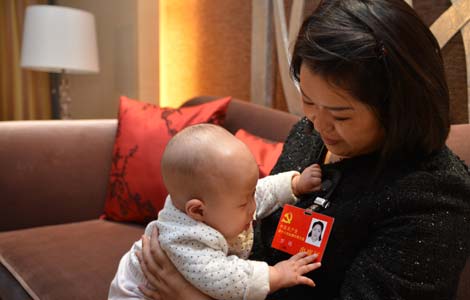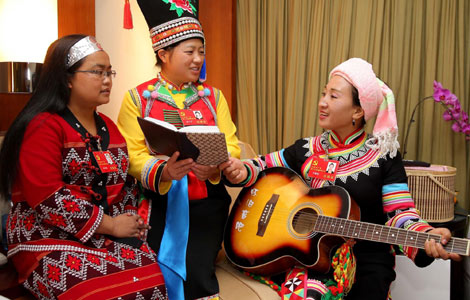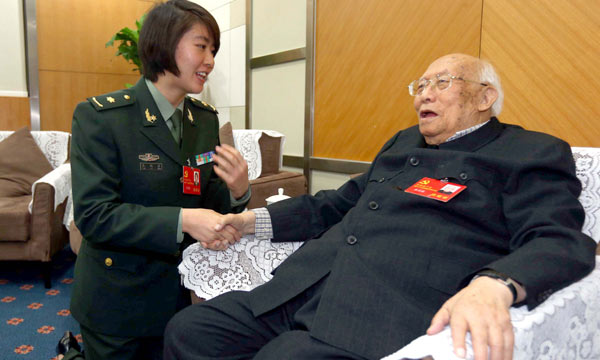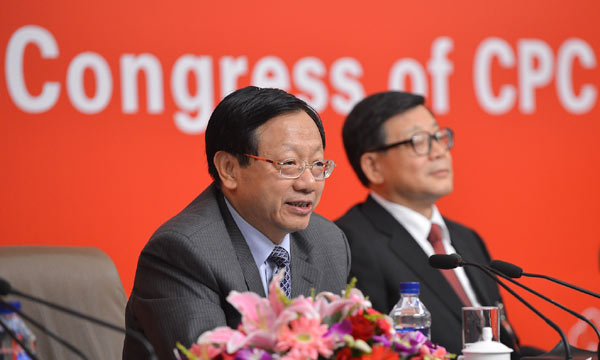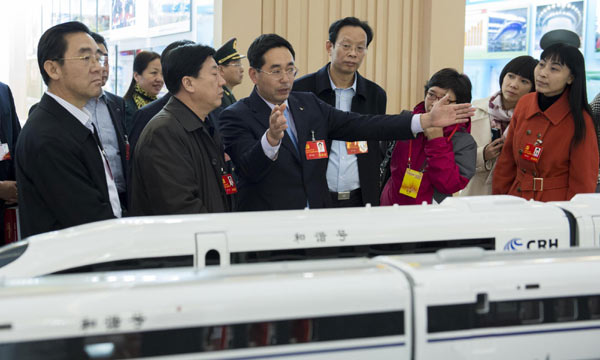Communist Party of China in brief
(People's Daily Online)
Updated: 2012-11-01 10:07
4. Organization
4.1 Central Organizations of the Party
4.1.1 The National Congress of the Party and The Central Committee of the Party.
The highest leading body of the Party is the National Congress and the Central Committee elected by it. The Central Committee is responsible, and report their work to the National Congress.
The National Congress of the Party is held once every five years and convened by the Central Committee. It may be convened before the normally scheduled date if the Central Committee deems it necessary or if more than one-third of the organizations at the provincial level so request. Except under extraordinary circumstances, the Congress may not be postponed.
The current Central Committee near the end of its term shall determine the number of delegates to the next National Congress of the Party and the procedure governing their election.
The Central Committee of the Party is elected for a term of five years.
The functions and powers of the National Congress of the Party are as follows:
To hear and examine the reports of the Central Committee;
To hear and examine the reports of the Central Commission for Discipline Inspection:
To discuss and decide on major questions concerning the Party;
To revise the Constitution of the Party;
To elect the Central Committee;
To elect the Central Commission for Discipline Inspection.
When the National Congress is not in session, the Central Committee carries out its decisions, directs the entire work of the Party and represents the Communist Party of China in its external relations.
4.1.2 The Political Bureau, the Standing Committee of the Political Bureau, the General Secretary of the Central Committee of the Party, the Military Commission of the Central Committee and the Secretariat of the Central Committee.
The leading bodies of the Central Committee are the Political Bureau, the Standing Committee of the Political Bureau, the General Secretary of the Central Committee of the Party.
The Political Bureau, the Standing Committee of the Political Bureau and the General Secretary of the Central Committee of the Party are elected by the Central Committee at the plenary session.
The General Secretary of the Central Committee must be Member of the Standing Committee of the Political Bureau.
When the Central Committee is not in session, the Political Bureau and its Standing Committee exercise the functions and powers of the Central Committee.
The General Secretary of the Central Committee is responsible for convening the meetings of the Political Bureau and its Standing Committee and presides over the work of the Secretariat.
The central leading military body of Communist Party of China is the Military Commission of the Central Committee.
The members of the Military Commission of the Central Committee are decided on by the Central Committee.
The Secretariat of the Central Committee is the working body of the Political Bureau of the Central Committee and its Standing Committee. The members of the Secretariat are nominated by the Standing Committee of the Political Bureau of the Central Committee and are subject to endorsement by the Central Committee in plenary session.
4.2 Local Organizations of the Party
The Party congress of a province, autonomous region, municipality directly under the Central Government, city divided into districts, or autonomous prefecture is held once every five years.
Local Party congresses are convened by the Party committees at the corresponding levels. Under extraordinary circumstances, they may be held before or after their normally scheduled dates upon approval by the next higher Party committees.
The number of delegates to the local Party congresses at any level and the procedure governing their election are determined by the Party committees at the corresponding levels and should be reported to the next higher Party committees for approval.
The functions and powers of the local Party congresses at all levels are as follows:
To hear and examine the reports of the Party committees at the corresponding levels;
To hear and examine the reports of the commissions for discipline inspection at the corresponding levels;
To discuss and decide on major issues in given areas;
To elect the Party committees and commissions for discipline inspection at the corresponding levels.
Local Party committees at various levels shall, when the Party congresses of the given areas are not in session, carry out the directives of the next higher Party organizations and the decisions of the Party. Congresses at the corresponding levels, direct work in their own areas and submit the work report to the next higher Party committees at regular intervals.
The Party congress of a province, autonomous region, municipality directly under the Central Government, city divided into districts or autonomous prefecture is elected for a term of five years.
The local Party committees at various levels meet in plenary session at least twice a year.
Local Party committees at various levels elect, at their plenary sessions, their standing committees, secretaries and deputy secretaries and report the results to the higher Party committees for approval.
The standing committees of local Party committees at various levels exercise the powers and functions of local Party committees when the latter are not at the session.
4.3 Primary Organizations of the Party
Primary Party organizations are formed in China's mainland enterprises, rural areas, government departments, schools, scientific research institutes, communities, mass organizations, intermediaries, companies of the People's Liberation Army and other basic units, where there are at least three full Party members.
In primary organizations, primary Party committees and committees of general Party branches or Party branches are set up as the work requires and according to the number of Party members, subject to approval by the higher Party organizations. A primary Party committee is elected by a general membership meeting or a delegate meeting. The committee of a general Party branch or a Party branch is elected by a general membership meeting.
A Primary Party committee is elected for a term of three to five years, while a general Party branch committee or a Party branch committee is elected for a term of two or three years.
4.4 Party Organs for Discipline Inspection
Party Organs for Discipline Inspection include the leadership of the Central Committee of the Party, the Party's commissions for discipline inspection at all levels and primary commissions for discipline inspection.
The Party's Central Commission for Discipline Inspection functions under the leadership of the Central Committee of the Party.
The Party's local commissions for discipline inspection at all levels and primary commissions for discipline inspection function under the dual leadership of the Party committees at the corresponding levels and the next higher commissions for discipline inspection.
5. Membership
Members of the Communist Party of China are vanguard fighters of the Chinese working class imbued with communist consciousness. Any Chinese worker, farmer, member of the armed forces, intellectual or any advanced element of other social strata who has reached the age of eighteen and who accepts the Party's Program and Constitution and is willing to join and work actively in one of the Party organizations, carry out the Party's decisions and pay membership dues regularly may apply for membership in the Communist Party of China.
New Party members must be admitted through a Party branch, and the principle of individual admission must be adhered to.
An applicant for Party membership must fill in an application form and be introduced by two full Party members. The application must be accepted at a general membership meeting of the Party branch concerned and approved by the next higher Party organization, and the applicant must undergo observation for a year-long probationary period before being granted full membership.
Every Party member, irrespective of position, must be organized into a branch, cell or other specific unit of the Party to participate in the regular activities of the Party organization.
Party members are free to withdraw from the Party. When a Party member asks to withdraw, the Party branch concerned shall, after discussion by its general membership meeting, remove his name from the Party rolls, make the removal public and report it to the next higher Party organization for the record.
Video
